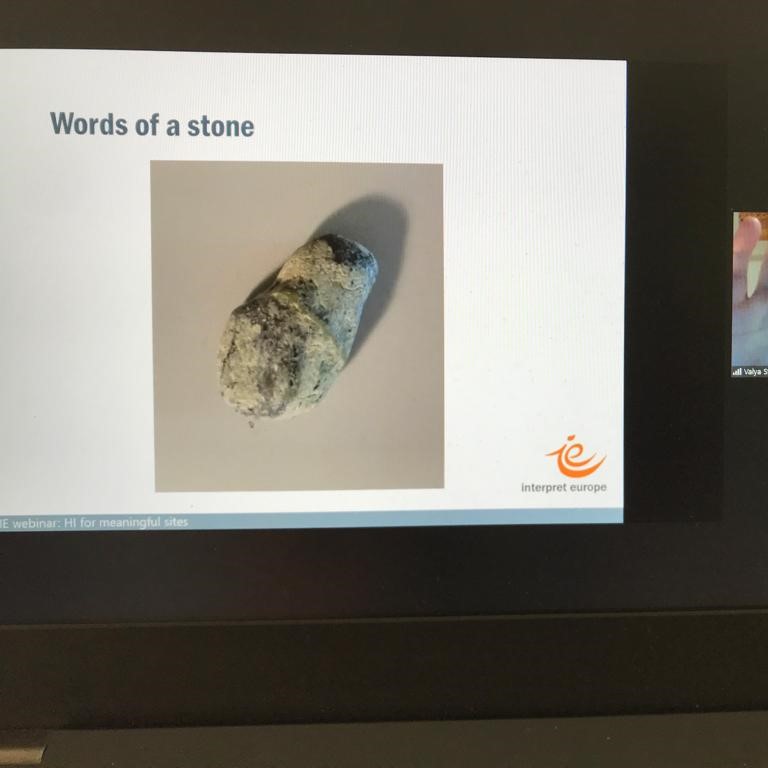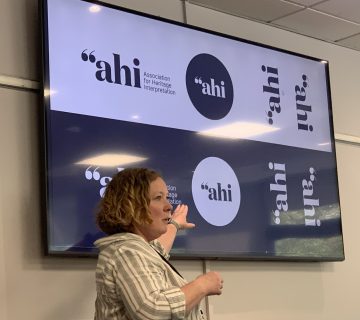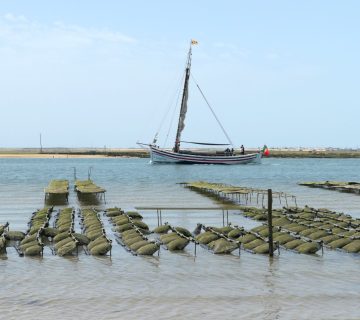IE’s Belgian team delivered an online event for heritage professionals and here shares some lessons learned and top tips for you to do the same.
It was a nice but heavy trip, the couple of weeks leading up to our event. ‘Team Belgium’ decided to prepare the first Interpret Europe Belgium webinar, entitled ‘An Introduction to heritage Interpretation: Towards more meaningful experiences at your natural or cultural heritage sites’. The goals: to promote heritage interpretation and Interpret Europe in Belgium and to strengthen the network of heritage professionals who want to learn more about heritage interpretation. We thought it would be useful to share our experience and some top tips on explaining heritage interpretation to people who don’t have a clue about it.
Some numbers: 100 Belgian heritage professionals signed up for this webinar (we were pretty proud of this). 90% weren’t yet IE members. 61 people joined on the day – a mixed group of heritage professionals from natural and cultural heritage sites, guides, design organisations, government, etc. Our promotion strategy worked: 61% of the people who filled out the feedback form said they would consider joining Interpret Europe (we are waiting for the numbers of people who actually joined).
But what did we learn, aside from the fact that an excellent speaker is of major importance for such events? (In this case, we invited Valya Stergioti, IE’s Training Coordinator, to give an introduction to IE’s approach to heritage interpretation and set the scene with some engaging activities.)
Here are our three top tips for explaining heritage interpretation to others who have never heard of it or for organising an introductory webinar on HI:
- Provoke your participants by giving examples of heritage interpretation that really show how heritage interpretation differs from ‘what most people working with/for visitors do in their daily work’. One participant in our webinar commented, “Actually it is distressing to see how little heritage organisations apply the principles and criteria of heritage interpretation”. Yes! This is the first step: make people recognise that heritage interpretation is different from what most heritage professionals apply in their work and yes, it brings an added value to the visitor experience. Goal 1 is achieved: the recognition of the profession.
- Relate: Build in exercises and moments for your participants to discuss their own practices and experiences (but don’t expect the outcomes to be excellent heritage interpretation analyses). Goal 2: having discussions about heritage interpretation is more important than getting the right results.
- Reveal: Build in exercises so that your participants experience that heritage interpretation is not easy to implement and that it is thus interesting to learn the skills from experts. Joining Interpret Europe is an excellent first step! Goal 3: you are creating a market for IE courses to be run in your country.
You should also be aware of these three recognisable appearances during an introductory webinar on heritage interpretation:
- People fall easily into their own working methods and ways of thinking that are familiar to them and feel ‘safe’. They may have just heard how heritage interpretation adds value to a visitor experience, but may realise it is not that easy to apply, for example, practising with ‘values and universals’ in an exercise and not understanding it immediately. Our advice: don’t give up! The penny (or cent) will eventually drop when you keep on provoking them and surprise them with good examples.
- People always want more time to prepare an exercise, but more time doesn’t always lead to better results. Instead of extending the preparation time, provide many small questions (asking them to react in the chat).
- When the exercises are well prepared and well explained, people are active and ready to share their opinions and even stories of personal objects (even online it works).
Conclusion: this was a fun event to run (and the Belgian team rocks!), we learned a lot and we will keep on building out this community of heritage professionals in Belgium who want to learn more and practice heritage interpretation in their daily work.
Laila De Bruyne is currently freelancing in cultural and heritage community building projects and is IE’s Country Coordinator Belgium. Knowledge sharing is like a thread through her career (former jobs and current commissions). You can get in touch with her at: Laila.debruyne@interpret-europe.net.
To cite this article: De Bruyne, Laila (2021) ‘Giving an introductory webinar on heritage interpretation – Lessons learned ’ in Interpret Europe Newsletter 2-2021, 11.
Available online: https://interpret-europe.net/wp-content/uploads/2021/06/Newsletter-Summer-2021.pdf




